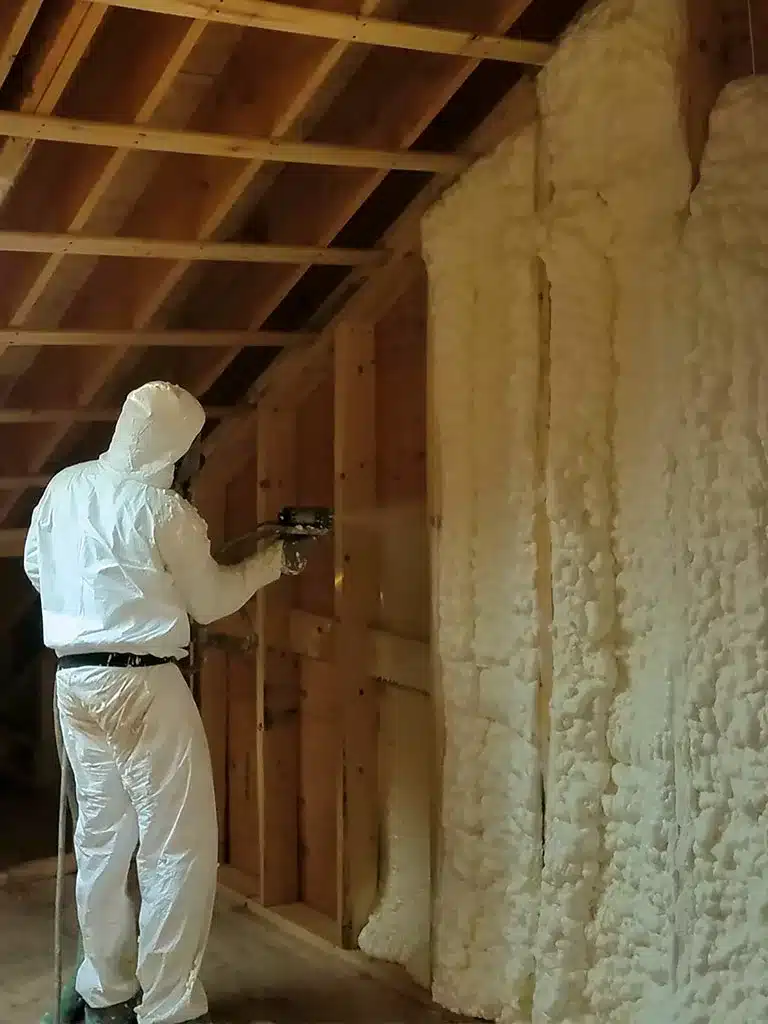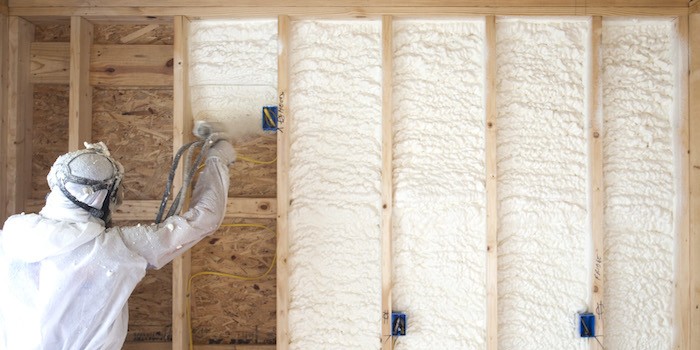Typical Myths Concerning Spray Foam: Debunking the Misconceptions
Typical Myths Concerning Spray Foam: Debunking the Misconceptions
Blog Article
Spray Foam: The Ultimate Option for Air Sealing and Insulation
Spray foam insulation has actually emerged as a leading remedy for effective air sealing and thermal insulation, offering a special mix of homes that set it in addition to conventional approaches. Its capability to expand and load spaces makes it specifically efficient in avoiding air leakage, which can significantly influence power effectiveness. Nonetheless, comprehending the complete scope of its benefits, installation processes, and contrasts with other insulation types is essential for making notified choices. As we discover these facets, the implications for both brand-new building and constructions and retrofits end up being significantly significant. What factors should affect your selection?
What Is Spray Foam?
Spray foam is a functional insulation product that combines the concepts of air sealing and thermal resistance to boost power efficiency in buildings. Composed largely of polyurethane or other similar substances, spray foam is applied as a liquid that broadens upon call with surface areas, creating a strong, constant layer of insulation. This special property allows it to fill voids, cracks, and gaps that typical insulation materials might neglect, supplying an exceptional air seal.
There are two main kinds of spray foam: open-cell and closed-cell. Open-cell spray foam is lighter and more flexible, offering excellent noise absorption and a lower R-value per inch - Spray Foam. On the other hand, closed-cell spray foam is denser, supplying a higher R-value, dampness resistance, and added structural honesty to developing components
The application process normally involves specific tools, ensuring a seamless application that follows various substrates, including wood, steel, and concrete. This flexibility makes spray foam appropriate for both brand-new building and constructions and retrofitting existing frameworks. Its capability to develop a closed barrier considerably adds to minimizing power consumption and improving interior air top quality, therefore making it a preferred option amongst home owners and building contractors alike.
Advantages of Spray Foam Insulation
Among the most significant benefits of spray foam insulation is its outstanding capacity to develop a constant air obstacle, which efficiently lessens energy loss. Unlike typical insulation products, spray foam expands to fill spaces and cracks, making sure that air leakage is drastically decreased. This characteristic not only boosts energy efficiency however also brings about decrease energy costs gradually.
In addition, spray foam insulation provides exceptional thermal resistance, adding to a much more stable interior atmosphere. Its high R-value per inch permits effective insulation in constrained rooms, making it perfect for attics, wall surfaces, and crawl areas. Additionally, the moisture-resistant properties of spray foam assistance stop mold and mildew and mildew growth, advertising much healthier living problems.
An additional essential advantage of spray foam insulation is its sound-dampening top qualities (Spray Foam). It properly lowers noise transmission in between spaces, creating a quieter and much more comfy home setting. The durability of spray foam likewise sticks out, as it does not sag or clear up over time, preserving its efficiency throughout its life-span
How Spray Foam Functions
Understanding exactly how spray foam insulation works is essential for valuing its efficiency in air securing and thermal resistance. Spray foam insulation includes 2 key parts: isocyanate and polyol material. When these parts are combined, they go through a chain reaction that creates the material to increase swiftly, producing a thick foam that fills cracks, tooth cavities, and voids.
As the foam broadens, it sticks to surfaces, developing an impermeable seal that considerably lowers air infiltration. This particular makes spray foam insulation extremely effective at stopping drafts and moisture penetration, which can bring about power loss and damages over time. Furthermore, the closed-cell version of spray foam provides remarkable thermal resistance as a result of its stiff structure, efficiently minimizing warm transfer.
The special properties of spray foam allow it to satisfy uneven surface areas, guaranteeing comprehensive insurance coverage and a smooth obstacle. Therefore, spray foam insulation not only enhances power effectiveness however also adds to improved indoor air quality by reducing the buildup of irritants and toxins. Ultimately, comprehending the technicians behind spray foam emphasizes its role as a superior selection for insulation check out this site and air sealing in both property and commercial applications.
Setup Refine Summary

Before setup, the room needs to be properly cleaned and prepped, making certain that surface areas are devoid of moisture, dirt, and debris. This action is critical due to the fact that contaminants can compromise adhesion and general efficiency. Once the location is prepared, the application includes mixing the 2 parts of the spray foam, which broadens upon contact and loads gaps successfully.
Trained specialists should conduct the installation, utilizing specialized devices to guarantee uniform protection and ideal thickness. Safety and security precautions, consisting of using protective gear and making certain correct air flow, are imperative throughout this process. After application, the foam commonly remedies quickly, forming a solid obstacle that enhances energy effectiveness.
Comparing Spray Foam to Conventional Insulation
When evaluating insulation alternatives, spray foam insulation stands out in comparison to conventional products such as fiberglass and cellulose. Unlike fiberglass and cellulose, which can permit air infiltration, spray foam expands upon application, filling gaps and voids to create a closed seal.
Furthermore, spray foam supplies a greater R-value per inch than conventional insulation types, supplying even more efficient thermal resistance in a thinner account. This particular is click to read specifically advantageous in spaces with minimal dental caries depth. Spray foam is resistant to wetness and mold development, which can be a significant concern with cellulose and fiberglass, particularly in moist atmospheres.
Nonetheless, spray foam insulation typically lugs a higher in advance expense than its standard counterparts. Property owners must consider this preliminary financial investment versus long-lasting energy financial savings and performance advantages. Eventually, while both insulation kinds serve their function, spray foam becomes an extra sophisticated solution for contemporary insulation needs, especially in regards to air sealing and thermal efficiency.

Verdict
In summary, spray foam insulation stands for a highly effective solution for achieving optimum air sealing and thermal resistance. Its unique buildings, consisting of moisture resistance and noise dampening, make it suitable for different applications in both new building and constructions and retrofitting jobs (Spray Foam). Although the initial prices may be greater compared to traditional insulation products, the long-term advantages, such as significant energy savings and boosted indoor air quality, justify the financial investment and emphasize its value in modern-day structure practices.
Spray foam insulation has actually arised as a leading option for efficient air securing and thermal insulation, supplying an one-of-a-kind mix of properties that set it apart from standard techniques.Spray foam is a click over here now flexible insulation product that incorporates the principles of air sealing and thermal resistance to improve power performance in buildings.When examining insulation alternatives, spray foam insulation stands out in comparison to typical materials such as fiberglass and cellulose. Ultimately, while both insulation kinds offer their function, spray foam arises as an extra innovative option for modern-day insulation demands, specifically in terms of air sealing and thermal performance.
In summary, spray foam insulation stands for a highly efficient solution for achieving optimum air sealing and thermal resistance.
Report this page